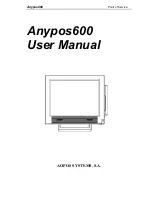
Access from the user program
KL1501, KL1512
28
Version: 3.1.0
5.3
KL1501 - Mapping in the Bus Coupler
As already described in the Terminal Configuration chapter, each Bus Terminal is mapped in the Bus
Coupler. This mapping is usually done with the default setting in the Bus Coupler / Bus Terminal. The
KS2000 configuration software or a master configuration software (e.g. ComProfibus or TwinCAT System
Manager) can be used to change this default setting.
The following tables shows the mapping of the KL1501 in the Bus Coupler, depending on the set
parameters.
5.3.1
Standard format
In the standard format, the KL1501 is mapped with 5 bytes of input data and 5 bytes of output data.
Default mapping for: CAN, DeviceNet, ControlNet, Modbus, RS232 and RS485 Couplers
Requirements
Word offset
High byte
Low byte
Complete evaluation: any
Motorola format: no
Word alignment: no
0
D0
CB/SB
1
D2
D1
2
Res.
D3
Default mapping for: Profibus and Interbus Coupler
Requirements
Word offset
High byte
Low byte
Complete evaluation: any
Motorola format: yes
Word alignment: no
0
D3
CB/SB
1
D1
D2
2
Res.
D0
Default mapping for: Lightbus & Ethernet coupler and Bus Terminal Controller (BCxxxx, BXxxxx)
Requirements
Word offset
High byte
Low byte
Complete evaluation: any
Motorola format: no
Word alignment: yes
0
Res.
CB/SB
1
D1
D0
2
D3
D2
Requirements
Word offset
High byte
Low byte
Complete evaluation: any
Motorola format: yes
Word alignment: yes
0
Res
CB/SB
1
D2
D3
2
D0
D1
Legend
Complete evaluation:
The terminal is mapped with control and status byte.
Motorola format
Motorola or Intel format can be set.
Word alignment
The terminal is positioned on a word boundary in the Bus Coupler.
CB
Control byte (appears in the process image of the outputs).
SB
Status byte (appears in the process image of the inputs).
D0
Data byte 0
D1
Data byte 1
D2
Data byte 2
D3
Data byte 3
Res.
This byte is assigned to the process data memory, although it has no function.
















































